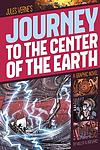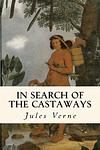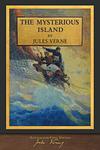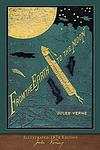Jules Verne
Jules Verne was a 19th-century French author known for his pioneering science fiction novels, such as 'Twenty Thousand Leagues Under the Sea' and 'Around the World in Eighty Days'. He is often referred to as the 'Father of Science Fiction' and his works have been translated into many languages, making him one of the most translated authors in the world. Verne's imaginative storytelling often included futuristic technology that was not yet invented during his time, and his books have inspired countless readers and writers in the science fiction genre.
Books
This list of books are ONLY the books that have been ranked on the lists that are aggregated on this site. This is not a comprehensive list of all books by this author.
-
1. Twenty Thousand Leagues Under the Sea
This classic science fiction novel follows the adventures of Professor Aronnax, his servant Conseil, and harpooner Ned Land as they are captured by the enigmatic Captain Nemo aboard the Nautilus, a technologically advanced submarine. As they journey 20,000 leagues under the sea, they encounter a variety of sea creatures and underwater phenomena. The narrative explores themes of exploration, scientific discovery, and man's relationship with nature.
-
2. Journey to the Center of the Earth
This science fiction novel revolves around a German professor who believes there are volcanic tubes leading to the center of the Earth. He, his nephew, and their guide embark on an adventurous expedition down an Icelandic volcano into the Earth's core. They encounter prehistoric animals, natural disasters, and otherworldly phenomena along their journey. The expedition is both thrilling and dangerous, testing the limits of their courage and survival skills.
-
3. Around the World in Eighty Days
The novel follows the journey of a wealthy Englishman who makes a high-stakes wager that he can travel around the world in eighty days. Accompanied by his loyal French valet, they encounter numerous obstacles and adventures across different cultures and landscapes, including rescuing a beautiful Indian woman from a ritual sacrifice. The book is a celebration of the technological advancements of the 19th century, with the main characters utilizing various modes of transportation such as steamships, railways, and even an elephant.
-
4. In Search Of The Castaways
This adventure novel follows the thrilling journey of Captain Grant's children, who embark on a global quest to find their missing father with the help of a detailed but cryptic message found in a bottle. Accompanied by the generous Lord Glenarvan and his crew aboard the Duncan, they navigate through South America, Australia, and New Zealand, facing natural disasters, encountering exotic locales, and overcoming formidable obstacles. Throughout their perilous expedition, the group demonstrates resilience, ingenuity, and unwavering hope, showcasing the human spirit's capacity to endure in the face of uncertainty.
-
5. The Mysterious Island
This novel follows the adventures of five prisoners of the American Civil War who escape by hijacking a balloon and crash-landing on an uncharted island in the Pacific. Using their skills and knowledge, they endeavor to survive and master the island's resources, uncovering its secrets along the way. Their ingenuity in the face of adversity, the discovery of a mysterious benefactor, and encounters with pirates weave a tale of exploration, survival, and the triumph of human intellect and camaraderie against the odds. The story is a testament to the enduring human spirit, the value of scientific knowledge, and the mysteries that the natural world holds.
-
6. From The Earth To The Moon
"From The Earth To The Moon" is a science fiction novel that follows the ambitious plan of a group of American Civil War veterans to launch a projectile to the moon. Set in the late 19th century, the story explores the scientific and technical challenges faced by the characters as they strive to achieve this extraordinary feat. The book delves into the themes of human curiosity, determination, and the boundless possibilities of scientific advancement.





